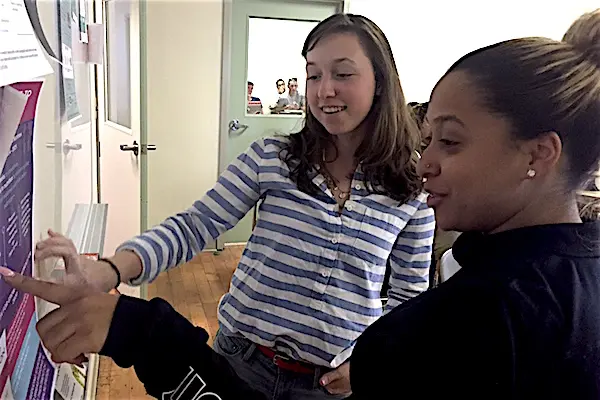Campaigns Raise Awareness of Healthy Eating

05/24/2016
By Karen Angelo
Psychology major James Fanning never saw a connection between pollution and obesity, but his thinking has changed as a result of a student-run public health campaign.
The goal of the Global Public Health course project was to teach public health students how to creatively share information so students will take action or better understand world health issues.
“The creation of the campaigns helped turn our students into committed public health professionals,” says Assoc. Prof. Maju Brunette of Public Health, who taught the Global Public Health course. “They researched the topic areas, created the materials and educated their fellow students, all of which truly engaged them in a professional public health role.”
Students worked in small groups, preparing posters, brochures, videos and other materials that they shared on social media, in person and on campus bulletin boards.
Nichol Smith and her team created index cards that included a description of the relationship between an individual’s economic and social position and obesity. She used her job as a shuttle driver to distribute the cards and talk to students.
“We handed out the cards and the students asked us questions while on the way to their destinations,” says Smith. “We also provided a link where they could view our Google Slides presentation for more details.”
Students Alyson Downs and Carolina Garcia created a video about the importance of eating right for women of child-bearing age. “This class has opened my eyes to many global problems and needs,” says Downs. “I hope that through my profession I can educate others on these issues.”
The students received a donation of a $100 gift certificate from Whole Foods and used it as incentive to gather feedback. Each campaign advertised that if students wrote brief paragraphs about what they learned, they would be entered into a raffle to win the certificate. Twenty-nine students from a variety of majors, including psychology, criminal justice, nursing, biology, electrical engineering and exercise physiology, responded.
Psychology major Fanning was surprised by the information learned from the presentation on obesity and socioeconomic status.
“I was able to walk away with several new bits of information,” he says. “I was unaware that pollution in the air and water can actually be a direct cause of obesity as toxins in these mediums get deposited into fatty tissue and begin to accumulate.”
Fanning also says “It also didn't occur to me that people living in poor neighborhoods wouldn't be able to go outside and exercise as much due to unsafe conditions.”
Exercise Physiology major Yonnie Collins says she’s now thinking twice about what she eats every day. “Malnutrition isn't only about children who are starving: This term includes anyone who isn't eating their essential vitamins,” says Collins. “This is a chronic issue that needs to be addressed among college students because the habits we form now follow us into adulthood.”
The experience gave public health students an appreciation for the important work of public health professionals.
Garcia says: “Our goal as public health professionals is to educate and that will ultimately lead to better quality of life around the world.”
